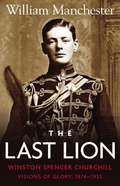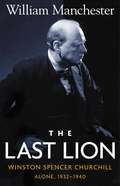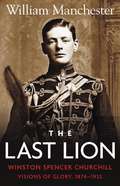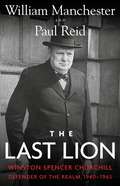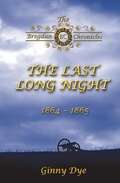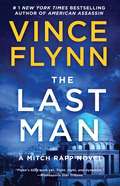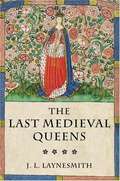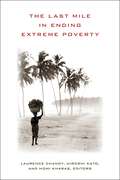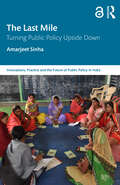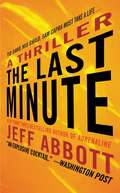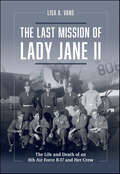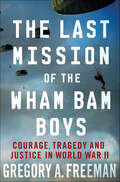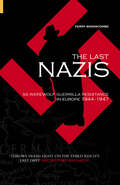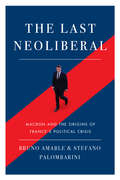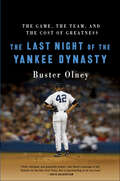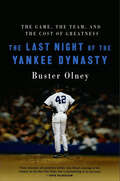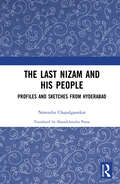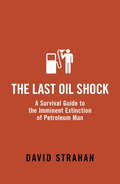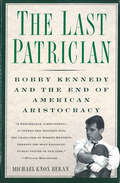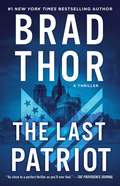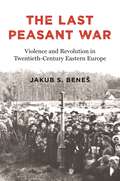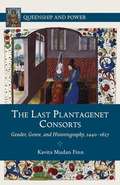- Table View
- List View
The Last Lion: Alone, 1932-1940
by William R. ManchesterThe second volume of this thorough Churchill biography.
The Last Lion: Visions of Glory, 1874-1932
by William R. ManchesterEarly life of Winston Churchill.
The Last Lion: Volume 1
by William ManchesterWilliam Manchester met Winston Churchill on January 24, 1953. Their encounter on the Queen Mary sparked an intense curiosity in Manchester that would eventually result in his classic three-volume magnum opus The Last Lion. In this, the first volume, we follow Churchill from his birth to 1932, when he began to warn against the remilitarization of Germany. Born of a lovely, wanton American mother and a gifted but unstable son of a duke, his childhood was one of wretched neglect. He sought glory on the battlefields of Cuba, Sudan, India, South Africa and the trenches of France. In Parliament he was the prime force behind the creation of Iraq and Jordan, laid the groundwork for the birth of Israel, and negotiated the independence of the Irish Free State. Yet, as Chancellor of the Exchequer he plunged England into economic crisis, and his fruitless attempt to suppress Gandhi's quest for Indian independence brought political chaos to Britain.Throughout, Churchill learned the lessons that would prepare him for the storm to come, and as the 1930's began, he readied himself for the coming battle against Nazism--an evil the world had never before seen.
The Last Lion: Winston Churchill: Visions of Glory, 1874 - 1932
by William ManchesterWilliam Manchester met Winston Churchill on January 24, 1953. Their encounter on the Queen Mary sparked an intense curiosity in Manchester that would eventually result in his classic three-volume magnum opus The Last Lion. In this, the first volume, we follow Churchill from his birth to 1932, when he began to warn against the remilitarization of Germany. Born of a lovely, wanton American mother and a gifted but unstable son of a duke, his childhood was one of wretched neglect. He sought glory on the battlefields of Cuba, Sudan, India, South Africa and the trenches of France. In Parliament he was the prime force behind the creation of Iraq and Jordan, laid the groundwork for the birth of Israel, and negotiated the independence of the Irish Free State. Yet, as Chancellor of the Exchequer he plunged England into economic crisis, and his fruitless attempt to suppress Gandhi's quest for Indian independence brought political chaos to Britain.Throughout, Churchill learned the lessons that would prepare him for the storm to come, and as the 1930's began, he readied himself for the coming battle against Nazism--an evil the world had never before seen.
The Last Lion: Winston Spencer Churchill: Defender of the Realm, 1940-1965 (The\last Lion Ser. #3)
by William Manchester Paul ReidSpanning the years of 1940-1965, THE LAST LION picks up shortly after Winston Churchill became Prime Minister-when his tiny island nation stood alone against the overwhelming might of Nazi Germany. The Churchill conjured up by William Manchester and Paul Reid is a man of indomitable courage, lightning fast intellect, and an irresistible will to action. THE LAST LION brilliantly recounts how Churchill organized his nation's military response and defense; compelled FDR into supporting America's beleaguered cousins, and personified the "never surrender" ethos that helped the Allies win the war, while at the same time adapting himself and his country to the inevitable shift of world power from the British Empire to the United States. More than twenty years in the making, THE LAST LION presents a revelatory and unparalleled portrait of this brilliant, flawed, and dynamic leader. This is popular history at its most stirring.
The Last Long Night (The Bregdan Chronicles #5)
by Ginny DyeCan they survive the Last, Long Night of the Civil War? The power of the Union army brings the South to its knees in surrender, but not until a year of intense pain and violence creates a chasm that may be impossible for the country to bridge. Carrie struggles to hold on to hope as the world caves in around her, hanging on to the promise she’s been given. She also finally gets to reveal the secret she has held so close. Moses is gravely wounded in battle. Aunt Abby faces danger as she gets more deeply involved with women’s rights, and spends time in Washington, D.C. Robert’s plantation takes a severe loss, but is saved from burning by an unlikely source. Rose continues to thrive in the Contraband Camp and finally has a dream come true.
The Last Man: A Novel (A Mitch Rapp Novel #13)
by Vince Flynn#1 New York Times bestselling author Vince Flynn &“has never been better&” (The Providence Journal) in this high-octane thriller following Mitch Rapp as he searches for a missing CIA asset, whose disappearance puts Rapp&’s own life at risk.Joe Rickman has spent the last eight years running the CIA&’s clandestine operations in Afghanistan, working with every disreputable figure in the Islamic Republic. When he suddenly goes missing, the initial assumption is kidnapping, but Mitch Rapp knows certain things about his old friend that gives him pause. When he&’s ordered to find Rickman, no matter the cost, Rapp knows his mission will be an exceptionally dangerous one. With the Taliban, Iran, Pakistan, and Russia all vying for a piece of the war-torn state and the FBI dispatching their own special agent to investigate, Rapp is facing his most difficult assignment yet. With white-knuckled twists and turns, The Last Man proves once again that Vince Flynn &“is a master—maybe the master—of thrillers in which the pages seem to turn themselves&” (Book Reporter).
The Last Medieval Queens: English Queenship 1445-1503
by J. L. LaynesmithAuthor tells about the importance of the nature and role of queen ship in the last years of medieval England. What sort of woman was chosen to be queen? What behaviour was expected of her? What power or authority was granted to her? How did the king use her in the exercise of his kingship?
The Last Mile in Ending Extreme Poverty
by Homi Kharas Laurence Chandy Hiroshi KatoThe past quarter century has witnessed a stunning reduction in the number of people around the world living on less than $1.25 a day, the marker for extreme poverty. This has led to a new sense of hope that extreme poverty can be eradicated within a generation. Yet optimism is tempered by the unique circumstances facing those who remain left behind and new challenges that weaken traditional paths to prosperity. The Last Mile in Ending Extreme Poverty explores what it will take to finish the course. It identifies three critical challenges that define the last mile: securing peace, creating jobs, and strengthening resilience. These are issues that development experts have largely overlooked, on which cutting-edge knowledge is blunt and best-practice solutions feel decidedly underwhelming.By uncovering evidence and approaches to address these issues--and while pointing out the knowledge gaps that remain--The Last Mile outlines an agenda to inform development research and poverty reduction strategies for governments, international organizations, donors, charities, and foundations around the world.Contributors: Michael Carnahan (Department of Foreign Affairs and Trade, Government of Australia), Raj M. Desai (Georgetown University and Brookings), Shane Evans (Department of Foreign Affairs and Trade, Government of Australia), Akio Hosono (JICA), Bruce Jones (Brookings), Marcus Manuel (Overseas Development Institute), John McArthur (Brookings and UN Foundation), Alastair McKechnie (Overseas Development Institute and University of Otago), Gary Milante (Stockholm International Peace Research Institute), Yoichi Mine (JICA and Doshisha University), Ryutaro Murotani (JICA), John Page (Brookings), Go Shimada (University of Shizuoka, JICA, Columbia University, and Waseda University), Stephen C. Smith (George Washington University and Brookings)er disasters, Go Shimada, JICA-RI Social protection and the end of extreme poverty, Raj Desai, Georgetown University and Brookings
The Last Mile in Ending Extreme Poverty
by Homi Kharas Laurence Chandy Hiroshi KatoViewed from a global scale, steady progress has been made in reducing extreme poverty-defined by the $1.25-a-day poverty line-over the past three decades. This success has sparked renewed enthusiasm about the possibility of eradicating extreme poverty within a generation. However, progress is expected to become more difficult, and slower, over time. This book will examine three central changes that need to be overcome in traveling the last mile: breaking cycles of conflict, supporting inclusive growth, and managing shocks and risks. By uncovering new evidence and identifying new ideas and solutions for spurring peace, jobs, and resilience in poor countries, The Last Mile in Ending Extreme Poverty will outline an agenda to inform poverty reduction strategies for governments, donors, charities, and foundations around the world.ContentsPart I: Peace: Breaking the Cycle of Conflict External finance for state and peace building, Marcus Manuel and Alistair McKechnie, Overseas Development Institute Reforming international cooperation to improve the sustainability of peace, Bruce Jones, Brookings and New York University Bridging state and local communities through livelihood improvements, Ryutaro Murotani, JICA, and Yoichi Mine, JICA-RI and Doshisha University Postconflict trajectories and the potential for poverty reduction, Gary Milante, SIPRIPart II: Jobs: Supporting Inclusive Growth Structural change and Africa's poverty puzzle, John Page, Brookings Public goods for private jobs: lessons from the Pacific, Shane Evans, Michael Carnahan and Alice Steele, Department of Foreign Affairs and Trade, Government of Australia Strategies for inclusive development in agrarian Sub-Saharan countries, Akio Hosono, JICA-RI The role of agriculture in poverty reduction, John McArthur, Brookings, UN Foundation, and Fung Global InstitutePart III: Resilience: Managing Shocks and Risks Environmental stress and conflict, Stephen Smith, George Washington University and Brookings Toward community resilience: The role of social capital after disasters, Go Shimada, JICA-RI Social protection and the end of extreme poverty, Raj Desai, Georgetown University and Brookings
The Last Mile: Turning Public Policy Upside Down (Innovations, Practice and the Future of Public Policy in India)
by Amarjeet SinhaThe Last Mile explores the gaps and dichotomy between drafted policies and their implementation, and the last mile challenges which often make public services inaccessible to the poorest and most vulnerable sections of society. It provides an in-depth overview of the dynamics between communities, research and consultation and the implementation of policies for development. Rich in empirical data and case studies from different government programmes and reports, this book examines the implementation of government service programmes for poverty reduction, women’s empowerment, and income generation for the poor, among others, from a people’s perspective. It highlights the need for policies and institutions to align their methods to community needs. Offering guidelines for redesigning as well as solutions to counter challenges related to lack of trust and effective communication, human resource management, capacity development, redressal mechanisms, and facilitating the last mile connection, the author delineates effective ways for integrating new technologies in policy implementation. The book also addresses legacy issues in institutions and re-orienting policy for better governance, transparency, and building trust. Part of the Innovations, Practice and the Future of Public Policy in India series, this book, by a senior practitioner, will be an essential resource for students and researchers of development studies, sociology, public policy and governance, economics, and South Asian studies. This book is freely available as a downloadable Open Access PDF at http://www.taylorfrancis.com under a Creative Commons (CC-BY-NC-ND) 4.0 license.
The Last Minute (The Sam Capra Series #2)
by Jeff AbbottSam Capra must commit an impossible assassination--or he will lose the only person in the world who matters to him . . . Sam Capra has one reason to live: to rescue his baby son from the people who abducted him. An ex-CIA agent, Sam now owns bars around the world as cover for his real mission-working undercover for a secret network as mysterious as it is powerful, while using his skills to find his child. Now the kidnappers have offered a deadly deal: they'll surrender Sam's child...if Sam finds and murders the one man who can expose them. Teaming up with a desperate young mother whose daughter is also missing, Sam tracks his prey-and his son-across the country in a dangerous race against time, and must unravel a deadly conspiracy if he's to rescue the only person in the world that matters to him.
The Last Mission of Lady Jane II: The Life and Death of an 8th Air Force B-17 and Her Crew
by Lisa A. VansFurther insight into the experience for 8th Air Force bomber crews over Germany, and in German captivity. New revelations about the investigation of the murder of several American bomber crewmen by German civilians. Learn personal stories about the crewmen of Lady Jane II, including the postwar struggles of the survivors.
The Last Mission of the Wham Bam Boys: Courage, Tragedy and Justice in World War II
by Gregory A. FreemanBefore the famed Nuremberg Tribunal, there was Rüsselsheim, a small German town, where ordinary civilians were tried in the first War Crimes Trial of World War II.As the tide of World War II turned, a hitherto unknown incident set a precedent for how we would bring wartime crimes to justice: In August 1944, the 9- man crew of an American bomber was forced to bail out over Germany. As their captors marched them into Rüsselsheim, a small town recently bombed to smithereens by Allies, they were attacked by an angry mob of civilians--farmers, shopkeepers, railroad workers, women, and children. With a local Nazi chief at the helm, they assaulted the young Americans with stones, bricks, and wooden clubs. They beat them viciously and left them for dead at the nearby cemetery.It could have been another forgotten tragedy of the war. But when the lynching was briefly mentioned in a London paper a few months later, it caught the eye of two Army majors, Luke Rogers and Leon Jaworski. Their investigation uncovered the real human cost of the war: the parents and a newlywed wife who agonized over the fate of the men, and the devastating effect of modern warfare on civilian populations. Rogers and Jaworski put the city of Rüsselsheim on trial, insisting on the rule of law even amidst the horrors of war. Drawing from trial records, government archives, interviews with family members, and personal letters, highly-acclaimed military historian Gregory A. Freeman brings to life for the first time the dramatic story. Taking the reader to the scene of the crime and into the homes of the crew, he exposes the stark realities of war to show how ordinary citizens could be drawn to commit horrific acts of wartime atrocities, and the far-reaching effects on generations.
The Last Nazis: SS Werewolf Guerrilla Resistance in Europe 1944-1947
by Perry BiddiscombeThe history of the shadowy Werewolf guerrilla bands formed at end of the Second World War as the last desperate defence of Nazis.Founded by Heinrich Himmler in 1944 when it became clear Germany would be invaded, the Werewolf guerrilla movement was given the task of slowing down the Allied advance to allow time for the success of negotiations or wonder weapons. Staying behind in territory occupied by the Allies, its mission was to carry out acts of sabotage, arson and assassination, both of enemy troops and of defeatist Germans.Perry Biddiscombe has researched the movement exhaustively, and details Werewolf operations against the British, Russians and fellow Germans, on the Eastern and Western Fronts and in the post-war chaos of Berlin. Giving the lie to the established story of a cowed German population meekly submitting to defeat, this is a fascinating insight into what has been described as the death scream of the Nazi regime.
The Last Neoliberal: Macron and the Origins of France's Political Crisis
by Bruno Amable Stefano PalombarinWhy centrist politics in France is bound to failThis book analyses the French political crisis, which has entered its most acute phase in more than thirty years with the break-up of traditional left and right social blocs. Governing parties have distanced themselves from the working classes, leaving behind on the one hand, craftsmen, shop owners and small entrepreneurs disappointed by the timidity of the reforms of the neoliberal right and, on the other hand, workers and employees hostile to the neoliberal and pro-European integration orientation of the Socialist Party. The Presidency of François Hollande was less an anomaly than the definitive failure of attempts to reconcile the social base of the left with the so-called "modernisation" of the French model. The project, based on the pursuit of neoliberal reforms, did not die with Hollande's failure; it was taken up and radicalised by his successor, Emmanuel Macron. This project needs a social base, the 'bourgeois bloc", designed to overcome the right/left divide by a new alliance between the middle and upper classes. But this, as we have seen recently on the streets of Paris and elsewhere, is a precarious process.
The Last Night of the Yankee Dynasty: The Game, the Team, and the Cost of Greatness
by Buster OlneyFor six extraordinary years around the turn of the millennium, the Yankees were baseball's unstoppable force, with players such as Paul O'Neill, Derek Jeter, and Mariano Rivera. But for the players and the coaches, baseball Yankees-style was also an almost unbearable pressure cooker of anxiety, expectation, and infighting. With owner George Steinbrenner at the controls, the Yankees money machine spun out of control. In this new edition of The Last Night of the Yankee Dynasty, Buster Olney tracks the Yankees through these exciting and tumultuous seasons, updating his insightful portrait with a new introduction that walks readers through Steinbrenner's departure from power, Joe Torre's departure from the team, the continued failure of the Yankees to succeed in the postseason, and the rise of Hank Steinbrenner. With an insider's familiarity with the game, Olney reveals what may have been an inevitable fall that last night of the Yankee dynasty, and its powerful aftermath.
The Last Night of the Yankee Dynasty: The Game, the Team, and the Cost of Greatness
by Buster OlneyFor six extraordinary years around the turn of the millennium, the Yankees were baseball's unstoppable force, with players such as Paul O'Neill, Derek Jeter, and Mariano Rivera. But for the players and the coaches, baseball Yankees-style was also an almost unbearable pressure cooker of anxiety, expectation, and infighting. With owner George Steinbrenner at the controls, the Yankees money machine spun out of control. In this new edition of The Last Night of the Yankee Dynasty, Buster Olney tracks the Yankees through these exciting and tumultuous seasons, updating his insightful portrait with a new introduction that walks readers through Steinbrenner's departure from power, Joe Torre's departure from the team, the continued failure of the Yankees to succeed in the postseason, and the rise of Hank Steinbrenner. With an insider's familiarity with the game, Olney reveals what may have been an inevitable fall that last night of the Yankee dynasty, and its powerful aftermath.
The Last Nizam and His People: Profiles and Sketches from Hyderabad
by Narendra ChapalgaonkarAs a Princely State, Hyderabad was the largest in population among over 560 tributary states under British paramountcy in colonial India. This book is a collection of profiles and sketches of some of the most important and influential people from the erstwhile Hyderabad State during the first half of the 20th century, which marked the last decades of its existence as a distinct entity under the British Raj. It features profiles of Mir Osman Ali Khan, the Seventh Nizam; Mir Laik Ali, the last Prime Minister of Hyderabad; Kasim Razvi; some of the Nizam’s administrators and diplomats; as well as Sir Walter Monckton, the Nizam’s British Constitutional Advisor; amongst others. Unfolding the pages of history, the text gives an insight into the administration and affairs of Hyderabad during this time, through an examination of the lives of the people closely associated with it. A unique contribution to the literature on modern Indian and colonial history, this book will be indispensable for students and researchers of history, modern Indian history, colonialism, imperial history, biography, and South Asia studies. It will also appeal to general readers interested in the history of Hyderabad.
The Last Oil Shock: A Survival Guide to the Imminent Extinction of Petroleum Man
by David StrahanThis may be the most important book you or anyone else will read in the next fifty years. Assuming humanity survives that long. Draining the lifeblood of industrial civilization, the terminal decline of oil and gas production will spark a crisis far more dangerous than international terrorism, and more urgent than climate change. World leaders know it, so why aren't they telling? The last oil shock is the secret behind the crises in Iraq and Iran, the reason your gas bill is going through the roof, the basis of a secret deal cooked up in Texas between George Bush and Tony Blair, the cause of an imminent and unprecedented economic collapse, and the reason you may soon be kissing your car keys and boarding pass goodbye. David Strahan explains how we reached this critical state, how the silence of governments, oil companies and environmentalists conspires to keep the public in the dark, what it means for energy policy, and what you can do to protect yourself and your family from the ravages of the last oil shock.
The Last Oil Shock: A Survival Guide to the Imminent Extinction of Petroleum Man
by David StrahanThis may be the most important book you or anyone else will read in the next fifty years. Assuming humanity survives that long. Draining the lifeblood of industrial civilization, the terminal decline of oil and gas production will spark a crisis far more dangerous than international terrorism, and more urgent than climate change. World leaders know it, so why aren't they telling? The last oil shock is the secret behind the crises in Iraq and Iran, the reason your gas bill is going through the roof, the basis of a secret deal cooked up in Texas between George Bush and Tony Blair, the cause of an imminent and unprecedented economic collapse, and the reason you may soon be kissing your car keys and boarding pass goodbye. David Strahan explains how we reached this critical state, how the silence of governments, oil companies and environmentalists conspires to keep the public in the dark, what it means for energy policy, and what you can do to protect yourself and your family from the ravages of the last oil shock.
The Last Patrician: Bobby Kennedy and the End of American Aristocracy
by Michael Knox BeranOverviewIn this provocative reassessment of one of the most controversial figures of twentieth-century American politics, Michael Knox Beran shows how Bobby Kennedy was shaped by values of the aristocratic class to which he had been brought up to belong. He was one of them - until he realized that the welfare state they had helped to create at home and the empire they had helped to found abroad were undermining some of America's most cherished traditions. In denouncing the welfare system as a "second-rate set of social services" and "hand-outs," and in questioning the imperial commitments that the patricians made in places like Vietnam, Bobby Kennedy was a prophet who accurately foresaw the changing direction of American politics. Challenging the work of Arthur Schlesinger Jr., Jack Newfield, and others, Beran demonstrates that Bobby was neither a pious liberal martyr nor a would-be revolutionary. He was a man who drew on the wisdom of Emerson, the ancient Greeks, and his own father's ideas about the transformative power of free markets - and used them to create a compelling vision of a better America.
The Last Patriot: A Thriller (The Scot Harvath Series #7)
by Brad ThorBrad Thor, master of suspense and #1 New York Times bestselling author is back with his highest-voltage thriller to date in which Navy SEAL turned covert Homeland Security operative Scot Harvath must race to locate an ancient secret that has the power to stop militant Islam dead in its tracks.June 632 A.D.: Deep within the Uranah Valley of Mount Arafat in Mecca, the Prophet Mohammed shares with his closest companions a final and startling revelation. Within days, he is assassinated. September 1789: U.S. Minister to France Thomas Jefferson, who is charged with forging a truce with the violent Muslim pirates of the Barbary Coast, makes a shocking discovery—one that could forever impact the world’s relationship with Islam. Present day: When a car bomb explodes outside a Parisian café, Scot Harvath is thrust back into the life he has tried so desperately to leave behind. Saving the intended victim of the attack, Harvath becomes party to a perilous race to uncover a secret so powerful that militant Islam could be defeated once and for all. But as desperate as the American government is to have the information brought to light, there are powerful forces determined that Mohammed’s mysterious final revelation continue to remain hidden forever. What Jason Bourne was to the Cold War, Scot Harvath is to the War on Terror. In The Last Patriot, readers will be engrossed as Harvath once again takes them on a whirlwind tour through international cities and nail-biting suspense where the stakes are higher than they have ever been before.
The Last Peasant War: Violence and Revolution in Twentieth-Century Eastern Europe
by Jakub S. BenešA history of the largely forgotten peasant revolution that swept central and eastern Europe after World War I—and how it changed the course of interwar politics and World War IIAs the First World War ended, villages across central and eastern Europe rose in revolt. Led in many places by a shadowy movement of army deserters, peasants attacked those whom they blamed for wartime abuses and long years of exploitation—large estate owners, officials, and merchants, who were often Jewish. At the same time, peasants tried to realize their rural visions of a reborn society, establishing local self-government or attempting to influence the new states that were being built atop the wreckage of the Austro-Hungarian and Russian Empires. In The Last Peasant War, Jakub Beneš presents the first comprehensive history of this dramatic and largely forgotten revolution and traces its impact on interwar politics and the course of the Second World War.Sweeping large portions of the countryside between the Alps and the Urals from 1917 to 1921, this peasant revolution had momentous aftereffects, especially among Slavic peoples in the former lands of the Austro-Hungarian Empire. It enabled an unprecedented expansion of agrarian politics in the interwar period and provided a script for rural resistance that was later revived to resist Nazi occupation and to challenge Communist rule in east central Europe.By shifting historical focus from well-studied cities to the often-neglected countryside, The Last Peasant War reveals how the movements and ambitions of peasant villagers profoundly shaped Europe&’s most calamitous decades.
The Last Plantagenet Consorts
by Kavita Mudan FinnAn examination of fifteenth-century British queens through literature and history.
